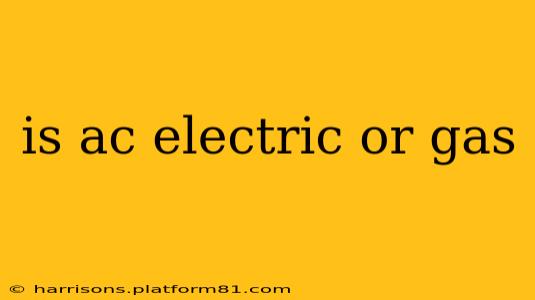The simple answer is: AC units are primarily electric, although some older or specialized models might use gas. Let's dive deeper into the common types and their energy sources.
What is the most common power source for an AC unit?
The vast majority of air conditioners you'll encounter in homes and businesses run on electricity. These systems use electricity to power a compressor, which circulates refrigerant to cool the air. This is the most efficient and widely available method for cooling.
Are there gas-powered air conditioners?
While less common, gas-powered air conditioners do exist. These systems, often referred to as gas absorption air conditioners, use a gas flame (typically natural gas or propane) as a heat source to drive the refrigeration cycle. They are not as efficient as electric AC units and are more often found in areas with limited access to electricity or where natural gas is abundant and inexpensive.
What are the pros and cons of gas-powered AC units?
Pros:
- Alternative fuel source: Useful in areas with unreliable electricity or high electricity costs.
- Potentially lower operating costs: In areas with cheap natural gas, operating costs could be lower than electric AC units, depending on pricing.
Cons:
- Lower efficiency: Generally less efficient than electric AC units.
- Higher initial cost: Gas absorption systems often have a higher upfront purchase price.
- Requires venting: Proper venting is crucial for safe gas combustion, adding complexity to installation.
- Maintenance: Regular maintenance, including gas line inspections, is essential for safety.
What type of fuel is used in gas air conditioners?
Gas air conditioners typically use natural gas or propane as their fuel source. The specific type of gas will depend on the availability and infrastructure in your area.
Are there other types of air conditioners besides electric and gas?
Yes, there are other types of air conditioners, though they are less common than electric and gas models. These include:
- Solar-powered AC units: These use solar panels to generate electricity, making them a more environmentally friendly option. However, they may require a backup power source during cloudy periods.
- Geothermal AC units: These systems use the earth's constant temperature to heat and cool a home, resulting in high efficiency. They require a significant upfront investment for ground loop installation.
Which type of air conditioner is best for me?
The best type of air conditioner for you depends on several factors, including:
- Your budget: Electric AC units generally have lower upfront costs, but gas units might have lower operating costs in certain circumstances.
- Your energy costs: Compare the cost of electricity and gas in your area to determine the most economical option.
- Your location and access to utilities: Gas AC units might be more suitable in remote locations with limited access to electricity.
- Environmental concerns: Solar or geothermal options offer more eco-friendly choices, but usually at a higher initial cost.
In conclusion, while gas-powered air conditioners exist, electric AC units are the predominant type due to their higher efficiency and widespread availability. The best choice for your home ultimately depends on your specific needs and circumstances. Consulting with an HVAC professional is recommended to determine the most suitable option for your situation.
